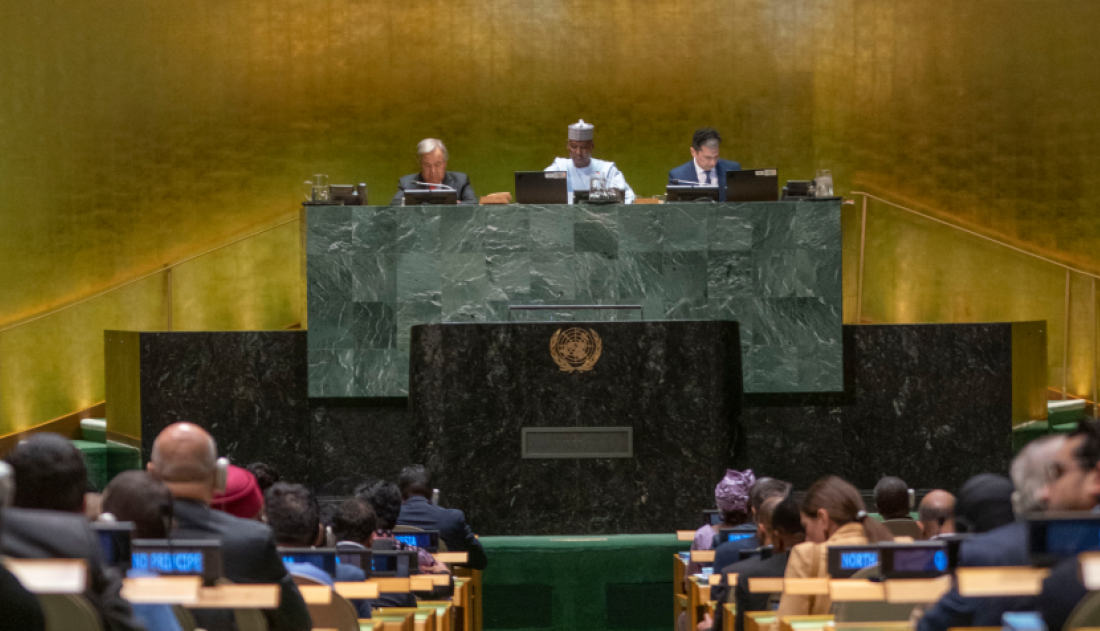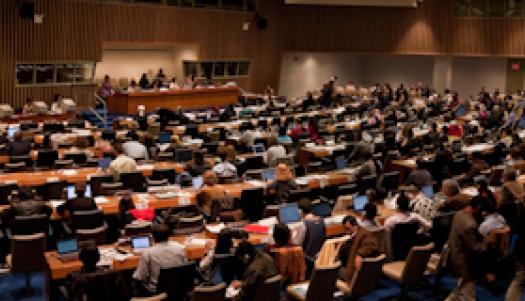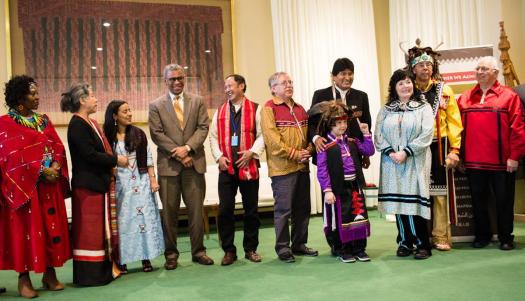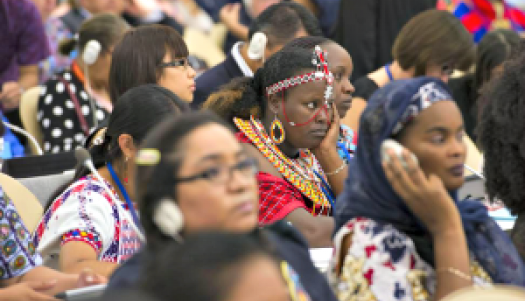The 2019 International Year of Indigenous Languages is an important international cooperation mechanism dedicated to raising awareness on the critical loss of Indigenous languages, and the urgent need to preserve, revitalize and promote them, as well as mobilize different players and necessary resources to take coordinated and long-term oriented action around the world.
For the articulation of the major objectives of the 2019 International Year of Indigenous Languages (IYIL2019), UNESCO, as a lead UN agency, facilitated the development of an Action Plan for the International Year and established a Steering Committee for its organization. The Action Plan is being implemented in consultation and cooperation with Member States, the Permanent Forum on Indigenous Issues, the Special Rapporteur on the Rights of Indigenous Peoples and the Expert Mechanism on the Rights of Indigenous Peoples, as well as indigenous peoples and a range of different stakeholders.
On 27 January 2019, UNESCO hosted an Official Launch event at its Headquarters in Paris which provided a global forum for a constructive debate in which high-level speakers addressed new paradigms for safeguarding, promoting and providing access to knowledge and information for Indigenous languages’ users. On 1 February 2019, the President of the General Assembly convened a high-level event in New York providing a unique opportunity for Member States, Indigenous peoples and other stakeholders to begin the 2019 International Year of Indigenous Languages by exchanging views and good practices about the preservation, promotion and revitalization of Indigenous languages.
During its 18th session in 2019 the Permanent Forum on Indigenous Issues held a discussion on Indigenous languages. Among others, the Permanent Forum recommended the General Assembly to proclaim an International Decade on Indigenous Languages. During the celebration of the 2019 International Day of Indigenous Languages, the three UN mechanisms on Indigenous peoples also expressed support for the proclamation of the International Decade on Indigenous Languages. The Human Rights Council held an Annual Panel Discussion on the Rights of Indigenous Peoples in September 2019.
Nearly 900 activities taking place around the world have been registered on the online platform dedicated to the 2019 International Year of Indigenous Languages. The global calendar includes awareness-raising campaigns, capacity-building workshops, academic conferences, intergovernmental meetings, theatrical, musical and artistic performances, hackathons and online events, as well as celebrations of international days, international award ceremonies etc. 2019 International Year of Indigenous Languages has also enjoyed important visibility through a dedicated website, and has been widely covered by international media and an ongoing social media campaign.
Nearly 900 activities taking place around the world have been registered on the online platform dedicated to the 2019 International Year of Indigenous Languages. The global calendar includes awareness–raising campaigns, capacity-building workshops, academic conferences, intergovernmental meetings, theatrical, musical and artistic performances, hackathons and online events, as well as celebrations of international days, international award ceremonies etc. 2019 International Year of Indigenous Languages has also enjoyed important visibility through a dedicated website, and has been widely covered by international media and an ongoing social media campaign.
As a follow up to the UN General Assembly Resolutions 73/156 (op 24 and 25) and building on the strength of the Action Plan for organizing the 2019 International Year of Indigenous Languages (E/C.19/2018/8), The Steering Committee for the organization of the 2019 International Year of Indigenous Languages with the support of UNESCO, launched a global consultative process for the elaboration of a Strategic Outcome Document. Several important international and regional meetings were held bringing together representatives of the Member States, Indigenous Peoples, UN-system organizations, language advocates, experts, academia and other public and private partners to reflect on language revitalization, support, and access and promotion aspects. The outcomes of those events contributed to the preparation of the above-mentioned document. Furthermore, an open drafting group was established for the consolidation of different views. Online consultations through a dedicated online platform also helped to integrate additional comments and contributions received from a large An outcome of the coordinated and collaborative global efforts from a variety of stakeholders, the 2019 International Year of Indigenous Languages concluded with increased awareness on the critical situation of many Indigenous languages worldwide and different stakeholders mobilized for future joint actions around the world.
The General Assembly, in its resolution 73/156, requested the President of the General Assembly to convene a High-level event of the General Assembly to mark the closing of the 2019 International Year of Indigenous Languages. This event will be held on 17 December 2019 at the United Nations Headquarters in New York, USA.
The overarching objective of the one-day event is to fulfill the terms of the Resolution. It aims to bring together Member States, Indigenous Peoples, UN-system organizations and other relevant stakeholders to take stock of the current situation of indigenous languages worldwide, analyze existing challenges and assess progress made, and share key conclusions and lessons learnt about the preservation, promotion and revitalization of indigenous languages.
To download the Programme, please click here >>>
- 1. Traditional Welcome
- 2. Opening Segment and Remarks
- 3. Plenary Segment and Remarks
- 4. Closing Segment and Remarks
Traditional Welcome by Chief Tadodaho Sidney Hill, Onondaga Nation
Remarks from:
H.E. Mr. Tijjani Muhammad-Bande, President of the General Assembly
H.E. Mr. Liu Zhenmin, Under-Secretary-General for Economic and Social Affairs and Senior Official of the United Nations System to Coordinate Follow Up to the World Conference on Indigenous Peoples
Ms. Marie Paule Roudil, Director, UNESCO Liaison Office, New York
Ms. Yalitza Aparicio, UNESCO Goodwill Ambassador for Indigenous Peoples
Co-Chair representing Member States: H.E. Mr. Juan Fernando Velasco Torres, Minister of Culture and Heritage of Ecuador
Co-Chair representing indigenous peoples: Ms. Aili Keskitalo, President, Sami Parliament, Norway
National Chief Perry Bellegarde, Assembly of First Nations
Ms. Anne Nuorgam, Chairperson of the Permanent Forum on Indigenous Issues
Ms. Kristen Carpenter, Chairperson, Expert Mechanism on the Rights of Indigenous Peoples
Opening Plenary Meeting Webcast UN video| Meeting summary
Statements by Member States, Observers of the General Assembly, Indigenous Peoples representatives from the seven socio-cultural regions, and United Nations entities
Canada
Venezuela
Mexico (on behalf of the Group of Friends of Indigenous Peoples)
Representative, Indigenous Peoples Representative of socio-cultural region of Africa
Perú
Colombia
Representative, Indigenous Peoples Representative of socio-cultural region of the Arctic
Paraguay
New Zealand
Mr. Nicholas Barla, Indigenous Peoples Representative of socio-cultural region of Asia
Norway
Estonia
Mr. Alexey Tsykarev, Representative, Indigenous Peoples Representative of socio-cultural region of Eastern, Russian Federation, Central Asia and Transcaucasia | Russian
Russian Federation
Argentina
Mr. Elias Caurey, Indigenous Peoples Representative of socio-cultural region of Central and South America and the Caribbean
Japan
Costa Rica
Ireland
Mr. Khalid Choukri, Secretary General of the European Language Resources Association
Plenary Meeting
Webcast UN video| Meeting summary
Statements by Member States, Observers of the General Assembly, Indigenous Peoples representatives from the seven socio-cultural regions, and United Nations entities
Hungary
United States of America
Ms. Aminatu Gambo, International Indigenous Women’s Forum
El Salvador
Nepal
Mr. Leonidas Iza Salazar, President of the Movimiento Indígena y Campesino de Cotopaxi, Ecuador (MICC)
Bolivia
Ms. Oranee Jariyapotngam, Indigenous Education Networks
Panama
Guyana
Representative, Indigenous Movement for Peace Advancement and Conflict Transofrmation
Guatemala
China
Mr. Luis Delgado Hurtado, Yachay Wasi
Indonesia
Nigeria
Chief Chuck Hoskin, Jr., Cherokee Nation
Brazil
Mr. Alvaro Pop, Fund for the Development of Indigenous Peoples of Latin America and the Caribbean (FILAC)
Ms. Clara Morin Dal Col, Métis Nation
United Nations Children’s Fund
World Intellectual Property Organization
Plenary Meeting
Webcast UN video| Meeting summary
Co-Chair representing indigenous peoples: Grand Chief Wilton Littlechild, Ermineskin Cree Nation
Co-Chair representing Member States: Mr. Craig Ritchie
H.E. Mr. Tijjani Muhammad-Bande, President of the 74th session of the General Assembly
Concluding cultural performance by Mr. Luis Montalvo
Plenary Meeting
Webcast UN video| Meeting summary
Webcast UN video: Part I |Part II
Meeting summary
For more information on the International Year of Indigenous Languages, please see the following:
UNESCO website
President of the 74th General Assembly session website
#IYIL2019 #IndigenousLanguages #WeAreIndigenous

 Welcome to the United Nations
Welcome to the United Nations


